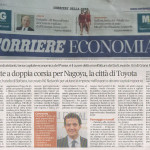Two million inhabitants, the third economic centre of the Country, it represents the manufacturing core of the Land of the Rising Sun. Grana Padano and MGM say yes.
Riccardo D’Urso, Barbara’s brother, created WJ Network to help companies to export and to attract Japanese capitals.
Nagoya, with more than two million inhabitants, is the fourth most populous city of Japan and the third for economic importance. Strategically located on the Pacific coast in the central region of Honshu Island, it is the first trading port of the Country and the capital of Aichi Prefecture, the beating heart of the Japanese manufacturing industry.
Technology
Center of the aerospace industry and base oflarge industrial and hi-tech companies, Nagoya is well known for Toyota and automotive technology. It is no accident that Nagoya is twinned with Turin, the city of theItalian car business, through an agreement signed in Japan by the former mayor Chiamparino in 2005, when the Prefecture of Aichi and Nagoya organized the Expo that in a few months will bring people from all over the world to Milan for the 2015 Edition.
Such a concentration of manufacturing not only contributes to the growth of GDP even more than any other area of Japan, but it is also accompanied by a diffuse wealth. In Nagoya the living standard is high and famous brands’ shops sell more here than in Ginza, theTokyo’s luxury shopping district. On the other hand the cost of living, compared to the quality offered by the City and the Prefecture, is relatively low. Even from the perspective of a foreign company, it represents an ideal environment: high manufacture quality, advanced research, reliable firms, technicians and workers renowned in Japan for their skills, advanced facilities and transports, institutions particularly oriented towards international cooperation.
Yet, only the 3% of the foreign partnerships with Japanese actors from Aichi Prefecture involves Italian firms. Nagoya has always been seen a harder market than Tokyo.
That could be true, at least at the beginning.
Nevertheless, there is a saying within the Japanese business community: “if you succeed in Nagoya, you will succeed all over Japan”. That is why Riccardo D’Urso, 44 y.o., entrepreneur and manager from Naples, who knows Japan very well, having studied, worked and lived there, set in Nagoya the base for his activities in the Far East.
D’Urso, brother of the tv celebrity Barbara, created WJ Network, an Italian-Japanese network based on international partnerships, supported by governmental institutions and a local financial and entrepreneurial network.
Cheese and Truffle
In his interview to Corriere – Economia, D’Urso declared that his aim is the creation of a new “Made in Italy” business community, which could stand as a reference for financial, commercial and cultural activities between Italy and Japan. Food and beverage, Fashion, Design, Entertainment and Tourism represent the privileged sectors. In such areas, it will be set up newcos with Italian-Japanese capital, directly promoting and managing the Made in Italy.
Many firms have already joined D’Urso, such as the Grana Padano consortium, Studio Rotella (architecture and design) and MGM, a distributor of truffles and high-quality food products which is creating an international centre for the promotion of Japanese cuisine and food in Milan.
D’Urso has also launched Wjtv, an Italian 3.0 tv network representing the evolution of Streamit Japan and addressed to Asian firms through ten channels dedicated to the promotion of made in Italy products.
The young Neapolitan entrepreneur embraced the slogan of “Mappe dei tesori d’Italia” (non-profit organization led by Claudio Chetta, general manager of the association): “Back to Culture, Back to Business”.
In this way, partner societies are stimulated to set up their internationalization activity based on the knowledge of the target country. Hiroyasu Naito, President and CEO of Rinnai Corporation, leader of gas boilers, acting as the Vice President of Nagoya Chamber of Commerce, states that Italian companies represent a model given their capability in endorsing, presenting and commercializing their products. “We have excellent, well manufactured and high quality products, but we are not so good at promoting them. Partnerships with Italian societies represent a successful opportunity of enhancing both Italian and Japanese products”.






